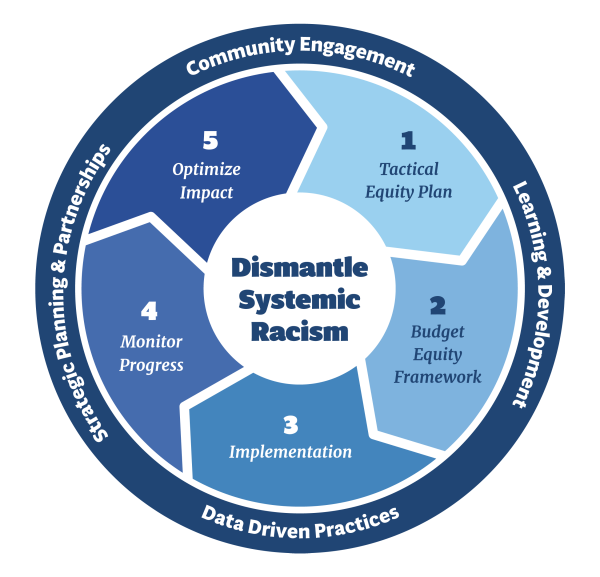Operationalizing Equity [STAGING]

Operationalizing Equity Model
The Operationalizing Equity model provides a comprehensive approach to addressing systematic gaps or disparities by cultivating opportunities to strengthen policies, practices, and city services within each department. The Operationalizing Equity model conceptualizes a five-step process, guided by four overarching domains to redesign local government systems to produce equitable outcomes.
Operationalizing Equity Model Domains
Step 1
Learning and Development:
DRE designs and facilitates expansive training modalities on racial equity and inclusion to empower city employees, departments, and our local government with the relevant tools to build equitable outcomes. Our Learning and Development curriculum contextualizes historic oppression, systemic racism, and implicit and explicit biases within the history of the City of San Diego and the United States more broadly.
Step 2
Data Driven Practices:
Utilizing data consists of using collected observations or measurements represented as text to capture experience, numbers, or metrics to track progress toward achieving distant outcomes.
Step 3
Community Engagement:
DRE cultivates partnerships to create an intentional approach to inclusive engagement by creating a space for community members to contribute their lived experiences and ideas to transform local government policies, programs, practices and budget decisions.
Step 4
Strategic Planning and Partnerships:
DRE is committed to working collaboratively with internal and external entities to create a sustainable network of support and synergy toward achieving equitable outcomes that are long term and far reaching.
Operationalizing Equity Model Steps
Step 1
Tactical Equity Plan (TEP):
The key function of a TEP is to capture goals and identify discrete objectives that each department can pursue to eliminate equity gaps.
Step 2
Budget Equity Framework:
Works in tandem with key terms, trainings, and tools to empower City Departments to accurately and succinctly communicate, and advocate for, their equity needs through the budget development process.
Step 3
Implementation:
Each department will sustain individual equity teams to guide the implementation of TEP goals and objectives.
Step 4
Monitor Progress:
To monitor the effectiveness of each action step outlined in TEPs, the DRE team will provide monthly Equity Centered Coaching (ECC) to support departments and their teams with documenting progress to eliminate disparities.
Step 5
Optimize Impact:
To build capacity for staff to take into consideration the complexities and incremental budget allocations that are needed to strategically sustain and build equitable systems, DRE will partner with departments to scale impact to sustain structural change.

